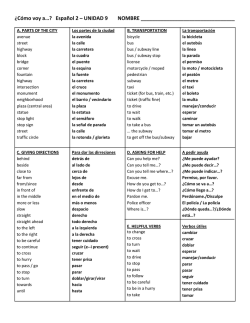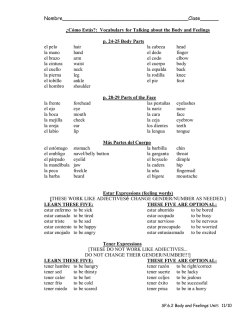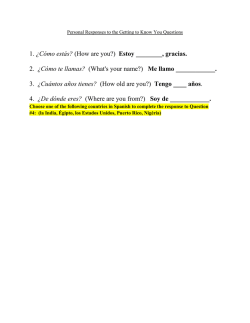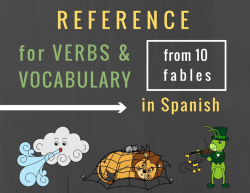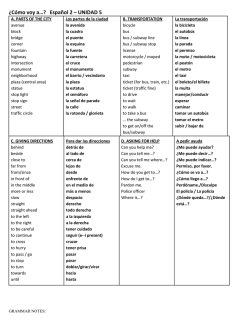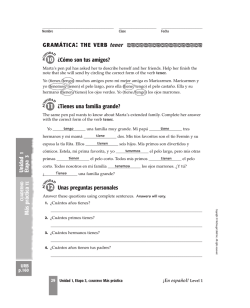
The Verb TENER
The Verb TENER Tener is a special verb in Spanish. It means to have. It is special because of two things: 1. tener is an irregular verb because the yo form is tengo 2. tener is one of a special class of verbs that change spelling in the root or stem when they are conjugated. We call these special verbs stem-changing verbs. Here are the forms of tener: tener - to have tengo tienes tiene tenemos tenéis tienen Notice that the endings are all the same for a normal -er verb, except that in the yo form, a -g stands before the -o. Also notice that three of the forms have a new spelling: the e in the stem has changed to ie. Circle the three forms with the spelling change, e to ie. ¿Tienes los aves o las mariposas? Each question will ask if you have one thing or the other. Answer that you have one, neither, or both. Then tell one thing that each of your family members have, from the list in the box. 1. ¿Tienes muchos libros o pocos libros? 2. ¿Tiene Ud. unos hermanos o unos nietos? 3. ¿Tienes una hermana pequeña o una hermana grande? 4. ¿Tiene Ud. unos perros o un pez? Practice using the verb tener. Write the correct form in each blank. tener -- to have tengo tenemos tienes tenéis tiene tienen 1. Los doctores 2. Yo no mucha tarea hoy. 3. Anita tres hermanas. 4. Tú 5. Mi hermano y yo 6. Vosotros 7. Mi madre muchos pacientes. una clase de historia, ¿no? cuatro caballos. mucho dinero, ¿verdad? muchos libros de filosofía. 8. Mis primos unos juegos buenos. 9. Nosotros un apartamento en Chicago. 10. Yo no un amigo rico. tener - to have tengo tenemos tienes tenéis tiene tienen Tener expressions: tener que ( + infinitive verb) to have to (do something) tener ganas de ( + infinitive) to feel like (doing something) tener _(number)_ años to be (number) years old tener calor to be hot tener frío to be cold tener hambre to be hungry tener sed to be thirsty tener razón to be right (correct) no tener razón to be wrong tener prisa to be in a hurry tener cuidado to be careful tener suerte to be lucky tener mala cara to look bad tener miedo de to be afraid of tener dolor de cabeza to have a headache tener dolor de estómago to have a stomach ache Translate carefully. 1. Tenemos mala cara. 2. Ella tiene cuidado. 3. No tengo razón. 4. ¿Tienes miedo de las arañas? 1. I am hot. 2. He is not thirsty. 3. My brother has a stomach ache. 4. Why are we in a hurry? Practice using tener. For each sentence, a translation is given. Fill in the blank with the correct form of tener, conjugated correctly and in some cases using tener ganas de or tener que. 1. Ella estudiar mucho. She has to study a lot. 2. ¿ mi cuaderno? Do you have my notebook? 3. No I don’t feel like reading books. 4. Abuelo Grandpa is seventy years old. 5. Mi padre no leer libros. setenta años. trabajar hoy. My father doesn’t feel like working today. 6. La mujer buscar a sus niños. The woman has to look for her children. 7. ¿ Do we have to eat the green beans? comer las judías verdes? 8. Ustedes no You all don’t have to dance with me. bailar conmigo. 9. Mis hermanos My brothers feel like breaking the t.v. 10. ¿Cuántos años How old are you? romper la televisión. ? Choose either tener, tener que, or tener ganas de to use in each blank. 1. Yo 2. ¿ Tú estudiar historia. doce años? 3. ¿Vosotros ayudar? 4. Mis primos vivir conmigo. 5. Nosotros una casa grande. 6. Nosotros no vivir en un apartamento. 7. Mi hermana no llevar sus zapatos. 8. Yo dos perros y tres gatos. 9. Los chicos estudiar matemáticas. 10. ¿Tú visitar a Abuela? 11. ¡Ella 12. Yo no setenta años! trabajar. Look carefully at each group of sentences. Each one has three missing verbs. Each group will use estar, ser, and tener one time each. Beside each sentence, write the correct, conjugated form of the 1. Manuel / perdido Mis primos / inteligentes Abuela / sesenta y ocho años 2. Yo / joven Tú / que estudiar Ellos / en mi casa 3. Nosotros / trabajadores Yo / alegre Mis padres / treinta y nueve años 4. Tú y yo / ganas de nadar Vosotros / tristes Tú / muy simpático 5. Mi hermano y yo / en el parque Yo / ganas de mirar la televisión Vosotros / amables 6. Ustedes / que comer el pollo Ellas / rubias Tú / enojado, ¿no? Practice using estar, ser, and tener. Translate each sentence carefully. 1. She is not sick. 2. I do not have five brothers. 3. He is old and wise. 4. We have four horses and three cats. 5. Do you have a headache? 6. They have two young daughters. 7. I am young and sociable. 8. We are not old. 9. Are you lost? 10. They are sad. I look bad. A. Ella tiene dos años. He is wrong. B. Tengo dolor de cabeza. We are hungry. C. No tengo miedo de perros. You are lucky. D. Tenemos hambre. He is twelve years old. E. Tienes seis hermanos. I have a stomachache. F. She is two years old. G. Tenemos frío. We are not cold. H. Él tiene doce años. You have six brothers. I. Tengo razón. I am not afraid of dogs. J. Tienes suerte. I have a headache. K. Él no tiene razón. She is in a hurry. L. Tengo mala cara. We are cold. M. Ella tiene prisa. I am right. N. No tenemos frío. Tengo dolor de estómago. Conjugate each verb in parentheses to complete the sentences: 1. Mi sobrina (estar) muy cansada. 2. mis amigos no (comer) el jamón. 3. Las galletas no (ser) viejas. 4. La carne de pavo (ser) para la cena. 5. Mis abuelos (estar) enfermos. 6. Nosotros (vivir) en Guatemala. 7. Los Allende (leer) muchos libros de literatura. 8. Yo no (enseñar) a Juan. 9. ¿Qué vegetales (comer) vosotros? 10. Tú (llevar) a tu hermana, ¿verdad? 11. Mis padres (tener) treinta y ocho años. 12. Nosotros (tener) que estudiar mucho. Fully conjugate this verb: creer -‐-‐ to believe Pablo is thirty-‐seven years old. Pablo tiene treinta y siete años. Translate: 1. Juanita is fourteen years old. 2. Pepe is sixty-‐four years old. 3. I am fifteen years old. 4. My new friend is ten years old. 5. Susana is fifty years old. 6. My little sister is three years old. 7. She is not twenty-‐three years old. 8. My mother and father are thirty-‐nine years old. 9. We are not 100 years old! 10. Are you twelve years old?
© Copyright 2026
